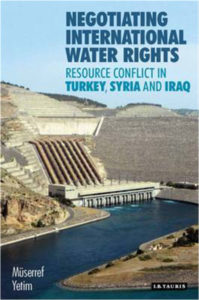
Negotiating International Water Rights: Natural Resource Conflict in Turkey, Syria and Iraq
Muserref Yetim
I.B. Tauris (2016)
Rs9,440
Transboundary watercourses account for an estimated 60 percent of global freshwater flow and support the livelihoods of hundreds of millions of people worldwide. Yet the indeterminate status of water rights in many international watercourses presents a problem and many attempts to resolve water rights issues have failed. Knowing how and where negotiations fail is essential if successful resolution is to be achieved. Muserref Yetim’s important book seeks to illustrate a means to the peaceful resolution of natural resource based conflicts.
Through a detailed study of the Tigris-Euphrates water conflict, involving Turkey, Syria, and Iraq, countries of vital security interest to the world at large. The author also clarifies the collective action dilemmas confronting Middle Eastern watercourses and reveals the bargaining bottlenecks where negotiations fail. She develops an original framework that explains bargaining failures and proposes conditions for creating a new property rights regime among watercourse states. This would offer a route to governing their shared water resources in ways that are politically, economically, and environmentally sound.
In almost all water scarce regions, international water resources are subject to intense unilateral exploitation in a highly competitive fashion. Then, as demand for freshwater continues to increase, through increasing urbanization and the continuing development of societies, so the issue of how such shared water resources can best be governed is becoming vitally important. Negotiating International Water Rights offers both a timely contribution to a matter of international concern and important insights into a resource conflict in countries of vital security interest to the world at large.
Muserref Yetim is an Assistant Professor in the Department of Politics at the New York University. Raised in Istanbul her research interests include natural resource conflict, international relations, environmental conflict, and the political economies of the Middle East and Latin America.
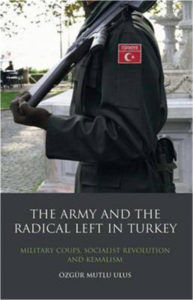
The Army and the Radical Left in Turkey: Military Coups, Socialist Revolution and Kemalism
Ozgur Mutlu Ulus
I.B.Tauris & Co Ltd. (2010)
Rs8,334
In 1960s Turkey, the armed forces and the radical leftist movement provided two very dynamic, but very different, political forces. However, somewhat surprisingly, the majority of radical leftists believed in the revolutionary potential of the armed forces in overthrowing the current regime and replacing it with a quasi-socialist one. This book considers the changing perspectives of the radical leftist movement towards the political role of the military in Turkey. Using a textual analysis of different leftist groups, including the Communist Party of Turkey, Ozgur Mutlu Ulus describes the development of the leftist movement in Turkey after the 1960 coup and explains why most leftists chose to encourage a military revolution, which they hoped would bring about the triumph of socialism in Turkey.
Ozgur Mutlu Ulus holds a PhD in Turkish Studies from University of Leiden.
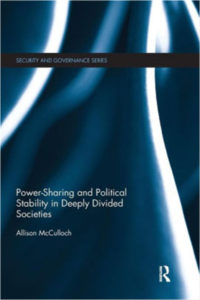
Power-Sharing and Political Stability in Deeply Divided Societies
Allison McCulloch
Taylor & Francis (2016)
Rs12,538
Nearly all the peace accords signed in the last two decades have included power-sharing in one form or another. The notion of both majority and minority segments co-operating for the purposes of political stability has informed both international policy prescriptions for post-conflict zones and home-grown power-sharing pacts across the globe.
This book examines the effect of power-sharing forms of governance in bringing about political stability amid deep divisions. It is the first major comparison of two power-sharing designs - consociationalism and centripetalism - and it assesses a number of cases central to the debate, including Nigeria, Sri Lanka, Fiji, Bosnia and Herzegovina, Burundi and Northern Ireland. Drawing on information from a variety of sources, such as political party manifestoes and websites, media coverage, think tank reports, and election results, the author reaches significant conclusions about power-sharing as an invaluable conflict-management device.
This text will be of key interest to students and scholars of ethnic conflict management, power-sharing, ethnic politics, democracy and democratization, comparative constitutional design, comparative politics, intervention and peace-building.
Allison McCulloch is an Associate Professor in the Department of Political Science at Brandon University.
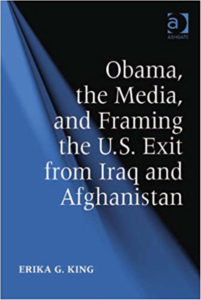
Obama, the Media, and Framing the U.S. Exit from Iraq and Afghanistan
Erika G, Professor King
Ashgate (2014)
Rs9,588
Situating Obama’s end-of-war discourse in the historical context of the 2001 terrorist attacks, Obama, the Media, and Framing the U.S. Exit from Iraq and Afghanistan begins with a detailed comparison with the Bush war-on-terror security narrative before examining elements of continuity and change in post-9/11 elite rhetoric. Erika King deftly employs two case studies of presidential and media framing - the weeks surrounding the formal announcements of Obama’s December 2009 ‘surge-then-exit’ strategy from Afghanistan and the end of combat operations in Iraq in August 2010 - to explore the role of mass media in presenting presidential narratives of war and finds evidence of an interpretive disconnect between the media and a president seeking to present a more nuanced approach to keeping America safe.
Eloquently scrutinizing Obama’s discourse on the U.S. exit from two post-9/11 wars and contrasting the presidential endgame frame with the U.S. mainstream media’s narratives of the wars’ meaning, accomplishments, and denouement provides a unique combination of qualitative content analysis and topical case studies and makes this volume an ideal resource for scholars and researchers grappling with the complicated and ever-evolving nexus of war, the president, and the media.
Erika G. King is Professor of Political Science at Grand Valley State University. She previously also served as Chair of Political Science and Dean of Social Sciences at GVSU. She holds a Ph.D. in Political Science from Northwestern University, and has published in the field of political communication and political psychology.
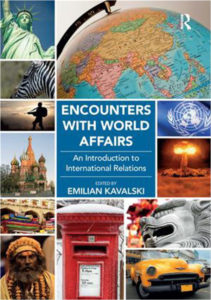
Encounters with World Affairs: An Introduction to International Relations
Emilian Kavalski
Routledge (2015)
Rs3,687
This book is designed to familiarise students with leading International Relations (IR) theories and their explanation of political events, phenomena, and processes which cross the territorial boundaries of the state. Thus, students will be exposed to the interplay between power, interest, ideas, identity, and resistance, in explaining continuity and change in international relations. Developed to provide students with the analytical tools and intellectual frameworks needed to understand the behaviour of different international actors in contemporary global affairs.
This textbook responds to the challenges of a dynamic job market by assisting students to gain both thorough theoretical knowledge and training them to apply this knowledge to real world problems. In short, this textbook delivers: A comprehensive and interdisciplinary approach to the examination of national, regional and global trends in politics, economics and socio-cultural developments allowing students to understand: the practice and theory of contemporary international relations; the politics, culture, history, and economies of different regions around the world; the role played by international interactions, culture, and government in local, national, and global settings. Equipping students with the proficiency: to understand and interpret the dynamics, patterns, and issues of global affairs; to know how to get more information about particular questions; to evaluate that information independently and effectively.
To these ends, the textbook provides a number of features that will appeal to students and avoids overwhelming students with chapters on topics which (in practice) are rarely on courses, while nonetheless providing a comprehensive overview of the field. Introduces students to the main debates, topics, and terms in the field and allows them to decide which they would like to focus on in their further studies.
Dr. Emilian Kavalski is Associate Professor of Global Studies at the Institute for Social Justice, Australian Catholic University.

